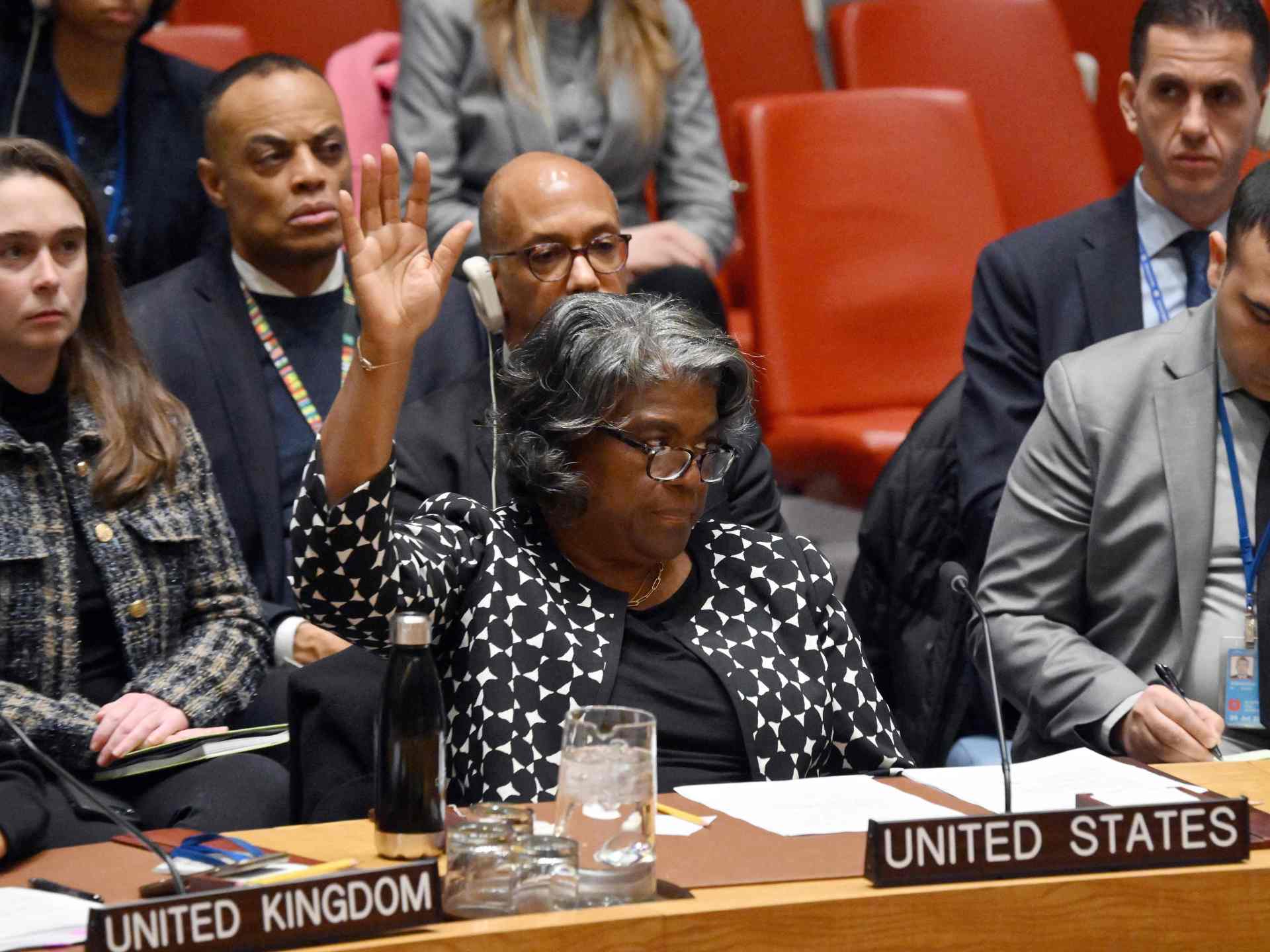US delegate to the Security Council, Linda Greenfield, raises her hand in objection to the Algerian draft resolution on Gaza (French)
Location: The UN Security Council, which is the most powerful institution of the United Nations, and whose headquarters are in New York City, USA.
The time: Tuesday evening, February 20, 2024, coinciding with the completion of the 137th day of the Israeli aggression against the Palestinian Gaza Strip, the number of whose victims exceeded 29 thousand martyrs, most of whom were women and children, in addition to the displacement of most of the residents of the Strip and the demolition of most of its homes.
The event: a discussion of a draft resolution submitted by Algeria, according to which the Security Council calls for “an immediate ceasefire for humanitarian reasons, respected by all parties.” The draft resolution also rejects “the forced displacement of the Palestinian civilian population,” and calls for an end to this “violation of international law.”
The Council consists of 15 members, including 5 permanent members: the United States, Britain, France, China, and Russia, and 10 non-permanent members, currently Algeria, Sierra Leone, Mozambique, Japan, South Korea, Switzerland, Slovenia, Malta, Ecuador, and Guyana.
Britain chose to abstain from voting, leaving 14 countries, 13 of which approved the resolution and one country, the United States, rejected it. Unfortunately, this is one of the five permanent member countries that has veto power, which
can
simply obstruct the issuance of any decision even if all countries agree to it. The other.
What is interesting is that this is not the first time, but rather the third time that Washington has used its veto power to obstruct the issuance of a decision in this regard since the start of the Israeli war on Gaza on the seventh of last October.
Israeli bombing destroyed most of the homes in Gaza (Al Jazeera)
But what prompted the largest country in the world to stand alone before a resolution requesting an end to a war that killed thousands of civilians and demolished thousands of homes?
The initial answer came during the voting session, where the US Ambassador to the United Nations, Linda Thomas-Greenfield, said that the draft resolution presented to the Council would not achieve the goal of sustainable peace, as she said.
Then Washington provided justifications that did not differ much during a press briefing by the US National Security Council spokesman, John Kirby - on Tuesday evening - where he said that the US administration does not believe that the time has come for a permanent ceasefire in Gaza, adding that any permanent ceasefire will allow the continuation of the ceasefire. Hamas control of the Gaza Strip.
Kirby added that his country supports a temporary ceasefire, for at least a week, which can be extended for up to 6 weeks, in order for Hamas to release its Israeli prisoners and deliver more humanitarian aid to Gaza.
A spokesman for the US National Security Council confirmed that they believe this option is more viable, he said.
American intentions
Before voting began on the Algerian draft resolution, American intentions had become clear, as the American delegate said that her country did not support taking action on this draft resolution, and if it was put to a vote in its current form, it would not be adopted, which is what actually happened.
Indeed, Greenfield had early revealed her country’s intentions towards the Algerian draft resolution during its preparation, and considered that Algeria’s initiative to issue a new resolution represents a “threat to undermine” the ongoing negotiations between Hamas and Israel, with American, Egyptian and Qatari mediation, to establish a new truce that includes the release of Israeli detainees in Gaza. And Palestinian prisoners imprisoned in Israel.
The American delegate added that the UN Security Council must ensure that “any action it takes in the coming days will lead to increased pressure on Hamas, so that it accepts the proposal on the table.”
Boo
It remains that the American position was met with great condemnation, as Palestine condemned it and considered it defies the will of the international community and gives an additional green light to the occupying state to continue its aggression against the Palestinian people in the Gaza Strip.
The Palestinian presidency expressed its surprise at the continued American refusal to stop the war of genocide waged by the occupation against the Palestinian people.
In turn, China expressed, through its Permanent Representative to the United Nations, Zhang Jun, its “deep disappointment” regarding the United States’ obstruction of a draft UN Security Council resolution calling for an immediate ceasefire in Gaza for humanitarian reasons, adding that the Council must press for the ceasefire that the delegate described. It is a moral obligation that the Council cannot evade.
"The American veto sends the wrong message and pushes the situation in Gaza to a more dangerous level," Zhang said, adding that objecting to a ceasefire in Gaza "is no different from giving the green light to the continuation of the massacre."
The Chinese delegate concluded his speech by warning that the extension of the conflict destabilizes the Middle East, which increases the risks of a broader war.
Source: Al Jazeera + agencies

